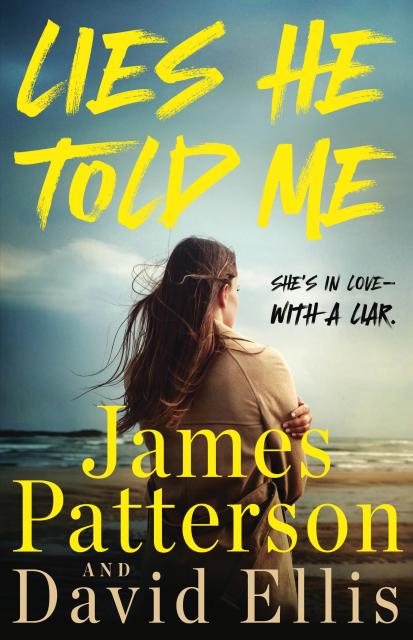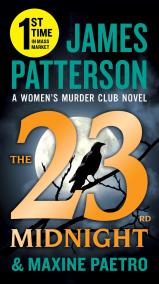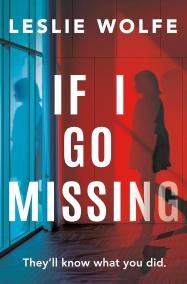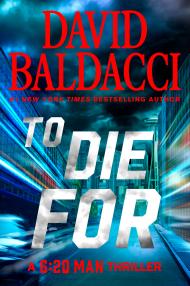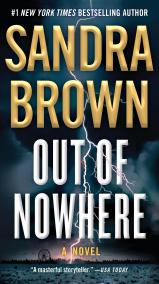Promotion
Use code BESTBOOKS24 for 25% off sitewide + free shipping over $35
Lies He Told Me
She’s in love—with a liar.
Contributors
By David Ellis
Formats and Prices
Price
$30.00Price
$39.00 CADFormat
Format:
- Hardcover $30.00 $39.00 CAD
- ebook $14.99 $19.99 CAD
- Audiobook Download (Unabridged) $24.99
- Trade Paperback (Large Print) $32.00 $41.00 CAD
This item is a preorder. Your payment method will be charged immediately, and the product is expected to ship on or around September 30, 2024. This date is subject to change due to shipping delays beyond our control.
Also available from:
“Wow! Lies He Told Me is a roller coaster from start to finish! I was hooked from the first page, and the final twist blew me away! This is a thriller you won’t want to miss!”
—Freida McFadden, #1 bestselling author of The Housemaid
Everyone in Hemingway Grove, Illinois, knows David and Marcie Bowers.
David owns the local pub.
Marcie is a former big-city lawyer who practices family law.
When David jumps into Cotton River to save a drowning stranger, he’s celebrated as a hero. His muscled physique, shaved head, and piercing blue eyes are broadcast on every news outlet.
For most people, newfound fame is a lifeline.
For David Bowers, it’s a death sentence.
For Marcie Bowers, it’s a test.
A wife knows the difference between a loving husband and father and a cold-blooded assassin. Right?
-
"Wow! Lies He Told Me is a roller coaster from start to finish! I was hooked from the first page, and the final twist blew me away! This is a thriller you won't want to miss!"Freida McFadden, #1 bestselling author of The Housemaid
- On Sale
- Sep 30, 2024
- Page Count
- 384 pages
- Publisher
- Little, Brown and Company
- ISBN-13
- 9780316403894
Book Trailers
What's Inside
PROLOGUE
•••
ONE
THIS IS HOW I lost David.
It started right here, on the trail near the bank of the Cotton River, late September, as we walked together, David in a shirt and tie, me in a dress but wearing David’s suit jacket. I didn’t need to tell him I was cold. He shrugged off his jacket the moment the wind whipped up, dropping it like an electric blanket over my shoulders. David always represented warmth to me, a human radiator; I usually had to roll away from him in bed at night.
“What are we doing?” I asked.
To our right, the Cotton River ribboned through our town. It was tranquil this time of year, especially with the unseasonable cold, below fifty, too chilly for even the most ardent Jet Skiers and boaters who refused to acknowledge the end of summer.
“You’re taking a walk with your husband on his birthday. Giving an old man his last wish.”
“Stop. Forty-two isn’t old.” I squeezed his arm. “And I have news for you, mate — you don’t look old, either.”
He laughed that off, but it was true. Old is the last word I would ever use to describe David — the picture of health, musclebound and trim, quick with that beaming smile.
“It’s the bald head,” he says. “Hides the receding hairline and the gray.”
Neither of which, as far as I could tell, was true. He’d always had that look, ever since the day I met him, thirteen years ago. Not many men can pull off a shaved head, but David could. The day I met him, my first take on him, in his tank top and shorts and running gear, was that he was a gym teacher, maybe a former football player who’d taken up marathon running after retirement.
“Here — stop,” he said.
“Right here on the path? Why?”
“What do you mean, why?” he said. “You said we could do whatever I wanted for my birthday.”
“Yeah, I did,” I said. “I figured it would involve me dressing up in a nurse costume or something. But whatever; it’s your call.”
David walked ten steps farther, then turned back to face me. Behind him, Anna’s Bridge, one of those creaky old truss bridges that always remind me of a carnival ride, though it looked majestic in the late afternoon, backed by a fluorescent orange sky, the river emblazoned with the sun’s reflection.
It was like a scene from a postcard.
“This is where we were standing,” he said. “The first time I saw you.”
I remembered. Of course I remembered. He’d stopped just in that spot, cooling off after a run, looking out over the river. I was jogging from the other direction, toward him, when I stopped right where I was now standing to adjust my music.
“You called out to me.”
He said to me then, What are you jamming on those headphones? Folk music? Polka? I laughed at the time. He was flirting with me, not particularly well, but I was drawn to his silliness, his confidence in being so playful, like he instantly knew for both of us that we were a match.
I remembered him two weeks later, when I ran into him at the start of a 10K race downtown. We ended up running the race together, clocking a slow time but talking and laughing all the while. It was some of the most enjoyable sixty‑one minutes and twenty-eight seconds of my life. We were married within a year.
Now in his crisp dress shirt and purple silk tie, David walked up and touched his forehead to mine. “I knew right then, Marcie, the first time I laid eyes on you right here. I swear I did.”
This, this was what he wanted to do before our swanky dinner tonight. This was his birthday wish. Not a Bears game or a night in Chicago; not a trip to Vegas. Anything he wanted, I’d told him, just name it, and his choice was to return to the place we first met. That was David, my corny, romantic husband.
He kissed me softly, then whispered, “Now, what was that about a nurse’s costume?”
I laughed, bumping teeth with his. Then I looked over David’s shoulder as an SUV sped onto Anna’s Bridge, veering wildly, drawing a horn from an oncoming vehicle. The SUV broke sharply to the right, crashing into the truss’s side gate with a hideous crunch, the protective railings snapping free, the entire bridge rocking and swaying as the SUV’s nose broke free of the bridge and dangled over the edge for just a moment, as if aimed at the river below —
“Oh, no,” I whispered.
— before surrendering to gravity, the SUV hitting the water grille‑first, bobbing and floating for a moment before sinking below the orange glow of the water.
David threw off his shoes and sprinted toward the bank of the river.
“David, no! No!”
“Find a tree branch or something we can grab!” he shouted as he bounded down the incline, through the tangled foliage by the river’s edge.
“You can’t go in there!”
“Stay on shore!” he shouted back at me. “You can pull us in! And call 911!”
The lifeguard rules buzzed through my head — Don’t bring victims ashore: keep them afloat until help arrives — as I called out to David again, pleading with him in vain: “David, don’t! David, don’t!”
I pulled out my phone as he swam furiously through the water toward the crash site.
Just like that, hardly more than a snap of a finger, and life would never be the same.
•••
TWO
COME UP, DAVID. Come up for air.
Sirens screamed out from a distance. Hemingway Grove police and fire, responding quickly, but it wouldn’t be quickly enough.
I’d kicked off my heels, ready to jump in, those lifeguard rules again stopping me. David was right. It was best that I stand by the shore, ready to haul people onto the bank if they could make it that far.
If.
“Come up, David.”
The SUV had fallen in the dead center of the river, which was the width of around half a football field, or so it had been described to me when I was a child. David had swum the twenty, maybe thirty yards in no time. That wasn’t the problem; he was a strong swimmer, a triathlete. The problem was how long he’d been under once he reached the spot where the SUV had sunk. I tried to keep track of the seconds but couldn’t stay calm, couldn’t trust my count. Forty‑five seconds? A minute? Maybe it was more like thirty seconds. Maybe he still had time.
I started toward the water, nearly sliding down the incline. I couldn’t fathom not going in to help David. But one thought kept me on solid ground, and it wasn’t the lifeguard rules. It was an ugly but necessary thought.
Our kids, Grace and Lincoln. They couldn’t lose two parents in one day.
I couldn’t believe I was even thinking such a thing, that David could be gone. He’d come up for air, right? Even if he couldn’t pry free the driver and any other passengers, his instincts would force him to the surface for air, right?
People were shouting from the bridge, people behind me, bikers and joggers, stopping and calling out, too. Some of the people on the bridge were taking videos with their phones. All eyes were fixed on the water, waiting helplessly.
The sirens grew closer.
I couldn’t believe this was happening. Minutes ago, nuzzling by the place we first met, sharing a treasured memory, remembering how lucky I felt to have him, and suddenly, just like that, David was . . . no, I couldn’t let myself believe it was possible.
It had been more than a minute since he’d been underwater. I was sure of it. My head woozy, I finally remembered to breathe, something my husband could not do.
Then all sound was lost as my vision grew fuzzy with tears. So many thoughts and emotions bombarding me . . .
— how will I tell the kids; how will it affect them?
— he’ll come up for air, of course he will;
— how unfair that he did everything right in life, followed the rules, cared for and loved his family, and he has to be taken away by the actions of some reckless, probably drunk, driver;
— he’ll survive, you know he will, you know David;
— why did today have to be his birthday, why did this have to be his birthday wish, why did we have to be at this spot, why couldn’t we have been anywhere else, anywhere else in the world?
And I felt myself but couldn’t hear myself screaming, shouting, pleading —
Then I sensed a whoosh overhead, a strong current of air passing over me. A helicopter, the words HEMINGWAY GROVE RESCUE on the side, racing through the air toward the crash site, as people on the bridge waved and pointed toward the spot in the water.
He’ll come up for air, I told myself. He just will.
The helicopter hovered over the area, dangerously close to the bridge. A panel door slid open automatically; a ladder unfolded from a mechanical lever, lowering to the water’s surface.
Jump in, I silently pleaded. Jump in and rescue him.
But I could see nobody in the helicopter save the pilot. The police hadn’t had time to scramble a rescue team — just the copter itself, from wherever it had been nearby.
He’ll grab the ladder, I told myself. They’ll fly him to safety. He’ll wave to the crowd a hero, and we will live happily ever after.
Believe it will happen. Believe it with all your will. It will happen. Believe it will happen.
Grab the ladder, David. Please. Please, David, grab the ladder and come back to us. Don’t leave us on your forty-second birthday, not when the kids are so young and need you, not when we have so much time left together.
Grab the ladder, David. Do it. Now.
A hand popped out of the water and grabbed a rung of the ladder.
•••
THREE
DAVID DID THE SMART thing: he didn’t try to swim with the unconscious man to the river shore. He stayed right where he was, his left arm wrapped around the ladder’s rung, his right arm around the chest of the man he’d pulled from the SUV, bracing himself against the current of the river.
I stood by the riverbank, still in shock, wilting with relief, feeling like a miracle had just been bestowed on me. But he wasn’t safe yet. That water was cold, and freezing water saps strength. How long could he hold both himself and a grown man out of the water?
I watched him, never took my eyes off him, while I hit Redial for 911. “A marine unit is on its way, ma’am,” I was told.
“Hold on — a boat is coming!” I shouted, but I was certain David couldn’t hear me, focusing his energy on staying above water, the harsh splashes from the river’s current, which seemed to be picking up, tossing him about while he clung to the ladder. Somehow, he managed to turn his head in my direction and find me. I waved to him and shouted, “I love you!” but he couldn’t possibly hear me or read my lips.
I saw it first from the reaction of the people on the bridge, pointing and jumping and shouting — the police rescue boat coming from the east, siren flashing, nearly flying over the water, racing to the scene.
“Get there, get there,” I whispered. “Hang on, David. Hang on just a little longer; they’re coming.”
The boat slowed and pulled up right alongside the ladder. Rescuers opened a side door on the boat and dropped some kind of wide, flat platform onto the water. Two officers crawled out onto it, as if carefully navigating an ice floe. One rescuer grabbed the man and pulled him onto the platform. The other rescuer dragged David onto the boat.
I exhaled the largest breath ever.
The boat sped off, presumably to some meeting point with an ambulance, while rescue workers looked to be performing CPR on the other man.
I ran back to our car, parked by the pub David owns, and drove quickly to the hospital. I called our daughter, Grace, who at age twelve had a phone. Hemingway Grove was a small town in most respects, and I wanted her to hear the news from me first. When I heard her voice, emotion clogged my throat. But I had to minimize the drama, the danger — I just told her that we’d had some excitement and Daddy had rescued a man who fell in the river. Everybody’s fine, I assured her.
Was I right?
•••
FOUR
BY THE TIME I arrived at St. Benedict’s Hospital, several reporters from the local news stations had already gathered. I pushed through them, found the receptionist in the emergency department, and before long was ushered inside.
I pushed open the curtain enough to see David, wrapped in several blankets, an IV in his right forearm. A doctor was examining him. David’s eyes began to tear up when they found mine. I rushed over, careful not to mess with anything, and put my hands on his face. “You’re okay. Are you? Are you —”
I managed that much before I choked up, bursting into tears.
“I’m okay, Marce,” he whispered, his voice hoarse. “God, am I glad to see you.”
“Is he okay?” I said to the nurse, a young woman. “He’s being treated for mild hypothermia,” she said.
“He should be fine. We’re keeping him in blankets and giving him a warmed saltwater solution in his veins.”
“Hey,” David said. “I’m fine.”
I pressed my lips against his forehead. I couldn’t embrace him, couldn’t hold him, swaddled as he was like an infant, other than to gently place an arm around his shoulder. The usual warmth that radiated off him was not there. His skin was discolored and cool to the touch.
“All I could think about . . . was you,” he said, his voice shaky and weak. “You and . . . the kids . . . the whole time.”
For the next three hours, I didn’t leave his side, except to call Grace with updates. Daddy is fine. Daddy is doing better. Daddy is warmer now. They say Daddy can come home later tonight. Our babysitter, who had planned on our being out late anyway for David’s birthday celebration — boy, did that feel like a distant memory — said everything was fine at home, that the kids watched the video over and over on Grace’s phone in between Grace texting with her friends and Lincoln, age ten, playing PlayStation 5 on our television.
There was video, apparently, of the incident. I remembered the people on the bridge with their phones out.
I could tell David was improving as time wore on by the wisecracks he made. Telling one of the nurses, who called me Mrs. Bowers, that I wasn’t his wife but his mistress. Asking me to go check if they had any extra nurse outfits we could bring home for later.
“Knock, knock.” A doctor, a young woman with horn-rimmed glasses, swung the curtain open, then swung it closed behind her. “I’ll need to take a look at that arm, Mr. Bowers.”
David had punched out the driver’s-side window during the rescue. He used his left hand, his dominant hand, leaving his left forearm and knuckles bloody and raw. There were additional cuts and abrasions on his head, shoulders, and back, incurred when he reached in, unbuckled the unconscious man, and pulled him out. Just imagining it, I had to remind myself to breathe; how he did all that in so short a time, underwater, was almost impossible to fathom.
If I ever doubted the existence of miracles, I no longer would.
“Turns out glass can cut you,” David said, his voice stronger now, as the doctor checked the stitches on one particularly bad wound.
“The driver who lost control of the car — he had an epileptic seizure,” said the doctor, looking up at us. “We were able to stabilize him. He’s going to make it.”
“Thanks to the air trapped inside the SUV,” said David. “Mostly thanks to you, Mr. Bowers.” The doctor nodded at him before resuming her look at his arm. “You know how many reporters are out there waiting for you to come out?”
“Ugh.” David’s head fell back against the pillow.
“The public relations guy here wants to do a press conference when you’re able,” she said.
“A press conference?” David scoffed. “For what?” “You should take a bow,” I said.
“Take a bow for doing something anyone would’ve done?” The doctor looked back up at him. “I’m not sure just anyone would have done what you did. Looked pretty heroic to me.”
“You — you saw it?” I asked.
“Oh, the video’s gone viral.” The doctor chuckled. “You haven’t seen it?”
Ah, yes, the video. Our kids had seen it, but we hadn’t. David had lived it, and I was not in a hurry to revisit those terrifying moments. Still, I looked at my phone. Typed in a few words — Cotton River Anna’s Bridge rescue — and there was the video, already online in several spots, mostly on social media but apparently even on the local news. David and I watched it together.
The video was taken from the bridge; it began as David swam madly toward the spot where the SUV went under and ran all the way through the arrival of the helicopter (which temporarily blocked the phone’s view before the person holding it moved), David’s reaching for the rescue ladder, victim in tow, and the marine unit of the Hemingway Grove Police Department coming to their assistance.
“Listen to your wife,” said the doctor. “You should be recognized.”
David let out a big sigh. “Doctor, you know what I want to do? After you tell me I’m free to leave? I want to go home and be with my family. That’s what I’ve wanted since the moment I hit that water. You think I earned that right?”
The doctor looked at David, then at me, and smiled. “I think you absolutely did.”
Around midnight, David was discharged. We were pretty sure that the reporters had gone home, but we left by the rear exit just in case. Walking into our home, normally a routine event, felt like a gift from heaven under the circumstances.
The kids were long asleep but had secured a promise that Daddy would come in and kiss them when he got home. Ten-year-old Lincoln, buried under his Avengers covers, moaned and mumbled but didn’t awaken. Grace, our twelve-year-old, never opened her eyes as David stroked her hair and kissed her cheeks. As we started out of the room, she mumbled, “Daddy’s okay. Daddy isn’t leaving.”
David crouched back down to her, nuzzled her face. “Daddy isn’t leaving, Gracie,” he said. “Daddy isn’t ever leaving.”
•••
CHAPTER SEVENTEEN
MY EYES POP OPEN, fear seizing me, though the tendrils of the nightmare have faded from my memory. My heart pounding, my eyes stinging from perspiration, I turn to David’s side of the bed, which is empty, the covers pulled down, the indentation of his head on the pillow.
I pat the bed for my phone and find it. The phone glows back at me with a time of 2:38 in the morning. Lulu, sleeping at the foot of the bed, lets out a loud sigh but otherwise doesn’t move.
I hear movement downstairs, footfalls, as if pacing. The faint murmur of David’s voice, low and deep.
I don’t have my contacts in but fumble for my cheater glasses on the nightstand. Then I send him a quick text message: Everything ok? I hit Send.
A ping sounds from inside the bedroom. David’s phone, resting on his nightstand, a power cord stuck inside it.
He doesn’t have his phone with him? Then who is he talking to and . . . how?
My feet drop onto the rug. My head swims in fogginess. I’ve tossed and turned all night, with all the craziness hap‑ pening. I’ve hardly slept. Though I somehow managed to miss David’s getting out of bed.
I walk into the hallway, lean on the banister that spirals down to the foyer by the front door.
“It’s not that simple, okay?” David whispers, almost a hiss. I take the stairs down, my hand on the railing, as I hear
David says something quickly that I can’t make out.
“Hey, Marce. You okay?” David, who must have heard me, walks into the foyer as I’m halfway down the stairs.
“Who were you talking to?” I whisper.
“Just . . . a private security company,” he says. “At two thirty in the morning?”
“Those places have 24‑7 service. I was thinking about hiring somebody.” He meets me on the stairs. “Maybe I’m overreacting, getting creeped out in the middle of the night. I just wanted to talk to them at least.”
“Okay. But . . . how?” I ask. “Your phone’s on the nightstand.”
“Oh, yeah, I know — the landline.”
“The landline?” I ask as we head back up the stairs. We never use the landline phone. We debated even installing one when we built this house.
“My phone was dying.”
“You were — you were saying it’s not that simple? What’s not that simple?”
David falls into our bed. “They’re going to call back later today. We’ll see if it makes sense to have someone stay around here for a while.”
I climb into bed. “Okay.” But it feels like it’s not okay. “I need sleep,” he says. “I’m exhausted.”
I put my head on the pillow and stare at the ceiling, thinking about the words I heard him say, the tone of his voice. Feeling like I’m missing something.
David rolls over, facing me, touching my arm. “I was just explaining to the guy on the phone that I had been thinking all these things happening to us were silly coinci‑ dences, but maybe it’s not that simple. That’s all it was.”
That doesn’t land well with me. That’s not what it sounded like. It sounded like the resolution of an argu‑ ment, something more emotional, more personal, more intimate. He was snapping at someone. He was flustered, upset.
It’s not that simple, okay?
I look at him but don’t say anything. What’s not that simple?
David closes his eyes and goes silent. I stay silent, too, but don’t close my eyes for hours.
•••
CHAPTER NINETEEN
IT’S NOT THAT SIMPLE, okay?
The words won’t leave my brain, no matter how forcefully I try to evict them. Unable to stay seated behind my desk, pacing my office, trying to focus on some motions and an interlocutory appeal I have to draft, but always returning to those words David spoke over the phone when he didn’t think I could hear him.
It’s not that simple, okay?
By noon, I’m losing my concentration. I want to see him. Sometimes I’ll drive to the pub for lunch, but usually I wait until after the rush, after one o’clock. Today, I’m not in the mood to wait.
I reach the pub at a quarter past noon. The lot is half full. A good crowd, but nothing crazy. Inside, the bar area — with its exposed brick, shiny oak tabletops, booths with leather seats, and brushed‑nickel overhanging lamps — is busy but not slammed. The bartender is Gwinne, an Italian beauty. She has looks that would qualify for a magazine cover, a cup size that would make any woman envious — I’m guessing they’re fake — and silky dark hair that bobs around in a ponytail. There isn’t a man in the bar who isn’t ogling her.
She gives me a little wave while she draws on the tap, pouring a beer. She’s never been particularly friendly and seems even less so now. The male customers sure love her, though.
“Is David here?” I ask.
“No, he’s not. I’m not sure where,” she says.
The dining area in the back is humming with activity. Most of the staff recognizes me with quick waves or nods, but they don’t have time to chat, buzzing between tables for orders or going back and forth from the dining area to the kitchen.
“Marcie, hi!” One of the assistant managers, Dennis, touches my shoulder as he passes.
“Hi, Dennis — is he in the back?”
“Oh, David had to step out. Said he’d be a few hours.”
“Oh — okay.” Shoot. He’s not here. That’s what I get for an unannounced pop‑in.
I pull out my phone and type a text:
Stopped by to say hi but missed you. Returning soon?
I poise my finger over the green Send button. But I don’t send it.
Instead I pause. Take a breath.
It’s not that simple, okay?
I hit the Backspace button and erase the entire text. I type this one instead:
Thinking of stopping by for quick lunch. Are you free?
This time, I hit Send.
I stand outside his office door, listening to the familiar symphony of the kitchen, burgers sizzling, pots scraping, hot oil hissing, people calling out to each other in English and Spanish, until my phone buzzes. A response from David:
We are crushed right now all hands on deck maybe later?
I read that text over and over, searching for any conceivable interpretation that isn’t a flat‑out lie.
What . . . what possible reason could he have to lie to me about where he is?
I won’t . . . I can’t let my mind go there.
With a burning in my chest, I put the phone in my purse and head for the exit. Out the window, it has started to snow, the wet, slushy kind. A waiter, a thirty-something guy named Jesse who’s been with David for years, calls out to me.
“Careful out there, Mrs. B.,” he says. “Something bad’s coming our way.”
I look at him and nod, force a smile. “Or it’s already here,” I mumble.
•••
CHAPTER TWENTY-FIVE
I STAGGER OUT OF the pub like a zombie, my chest burning, still stinging with disbelief as I read, for the tenth time, the text exchange I just had with David.
Me: Thinking of stopping by for quick lunch. Are you free?
David: We are crushed right now all hands on deck maybe later?
And yet David is not inside the pub. A flat‑out, undeniable lie.
It’s not that simple, okay? he said to someone on the phone last night, whispering downstairs on the landline. And his explanation didn’t ring true.
I sit in my car, shaking, unable to bring myself to turn on the ignition. I pick up my phone and start typing a search: How to tell
The first prompt is: if your spouse is cheating
God, am I that much of a cliché? I put down the phone. No. I’m not going to be that woman. If I have a question, I’ll ask it, no matter how crushing the answer might be. This isn’t me, harboring doubts, afraid to speak my mind. I will just ask him.
Why, David? Why did you lie about being busy at work when you weren’t actually at work? Where were you?
Does this have something to do with all these things happening to our family?
Yes, I decide as I drive back to the office for my appointment. I will just ask him.
At the office, I meet with my client Diane Worley, who has just reviewed a draft of the appeal I will file in the case where the judge let her ex‑husband off the hook for additional child support.
“This is so good, Marcie.” Diane sets down the document on my desk. “And you did it so fast.”
It took me more than six hours to get it into shape, but as always, I will cut my bill in half for a client like Diane, who can’t afford high legal fees. “It was fresh in my mind,” I say. “And the sooner we file, the sooner we overturn that ruling.”
“You think there’s a chance?”
“I do, yes. A decent chance. You never know with judges.”
I look around my office. Nothing fancy. Diplomas on the walls, family photos on my desk, a glamorous view of the parking lot through my window. But it’s mine. I may not enjoy matrimonial law as much as criminal defense, but at least I feel good about my clients now. And at least I call my own shots now.
I don’t know if the appellate court will overturn this decision. How teeth‑gnashingly frustrating it must be forDiane, knowing that the fate of her and her children’s financial well‑being rests in the hands of a selfish ex‑husband, blessed by a trial judge. And her husband off with another life, a young trophy wife at his side.
“Diane, can I — oh, you know what? Never mind,” I say. “What? You can ask me anything.”
“Well . . .” I drum my fingers on the desk. “How did you know? When did you first —”
“How did I know my husband was cheating on me?” She allows a bitter smile. “Oh, well — probably the first sign was that he was exercising more.”
Not an issue. David works out almost every day I’ve known him.
“Later on, I learned he’d opened a separate bank account and thrown some money in it and attached a debit card to it. He had the bills sent to work so I’d never see them.”
A separate bank account. Okay.
She leans forward. “But the real kicker for me was the burner phone.”
“A burner phone. A prepaid phone?”
It’s not that simple, okay?
Was David really talking on the landline when he whispered those words? Or did he have a second phone?
Diane nods. “When I caught him using another phone, I knew. Unless you’re a drug dealer or a terrorist, why else would you have a separate prepaid phone?”





